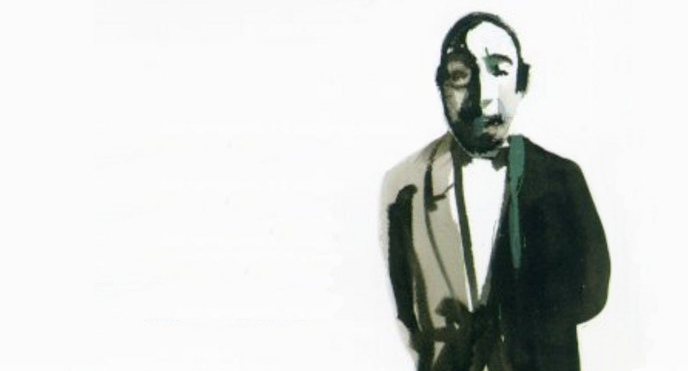Pablo Neruda found me in a strange way. I was still a teenager, obsessed with the Beats and pouring over Whitman in English class. I enjoyed writing poetry, but did not yet take it seriously. I was standing in the poetry section of the Barnes and Noble in the Cape Cod Mall, with my boyfriend, who was also an aspiring poet, trying to discern what new book to bite into. An older man who looked identical to Charles Bukowski, down to the mole on his face, appeared from around the corner of the shelf. Returning a book to the shelf, the man said, “This is what you should be reading. That’s the good stuff.” As he walked away, I looked to see what he had put back. It was a bilingual edition of The Captain’s Verses. Incredulous, I asked my boyfriend “did Bukowski’s ghost just tell us to read Neruda?”
I pored over The Captain’s Verses, fixated upon the balance of dedication, rage, and beauty. Neruda became my first love poetically, with this book of love poems. I went so far as to fashion a shirt with lines from “The Dream” on it. It would be years before I would learn of his politics, and his life’s trajectory. When I did, my relationship to Neruda solidified into its own kind of dedication. Neruda was honored with diplomatic posts, a common practice in some Latin American countries, but he became politicized after Franco’s regime assassinated Lorca. He treated politics with the same gravitas and polished reverence as he did romance. The Heights of Macchu Picchu granted me the same wonder as “Song of Myself” and laid a blueprint for how I could write politically without being didactic. When Neruda demands “let me have back the slave you buried there! / Wrench from these lands the stale bread / of the poor, prove me the tatters / on the serf,” he is asking something of the land, of its people and its history, with an urgency and clarity befitting a presidential candidate.
Neruda is the first poet I turn to in order to make sense of the world when I feel disillusionment or despair. In particular, his odes create awe from simplicity and even destitution. The recent collection All the Odes is a kind of bible for a poet’s heart. Philip Levine’s translation of “Ode to Salt” renders Neruda’s line “sazonado manjar tu oceania” to “your oceanity” in a way that feels less translated than a dialogue of the shared, secret language of poets. As someone who has often been told my feet have wings, I have a particular fondness for “Ode to Restlessness,” with lines like “if it weren’t for the bee’s singular / ambition, / honey would lay dormant in flowers” and “Restless reason / inaugurated the seas / and made buildings / rise out of chaos.” In this ode, Neruda praises the tenacity of movement, and in turn I am able to reconcile my own restlessness as necessary.
Neruda has been canonized by Harold Bloom and dubbed one of the greatest poets of the last century by countless literary minds. To me, these accolades attest to my teenage infatuation—the work was undeniably gorgeous and crafted by a master. However, Neruda earned a kind of praise even more rare than high esteem: the love and respect of his people. He died in 1973, two years after winning the Nobel Prize and twelve days after Pinochet’s coup in Chile eradicated the socialist promise of Salvador Allende’s presidency. Neruda, who had been an advisor to Allende, was in the hospital at the time of the coup, dying of cancer. After his death, Pinochet’s troops destroyed Neruda’s home. One of my favorite prose writers, Eduardo Galeano, wrote about Neruda’s funeral procession in his Memory of Fire trilogy, recounting that “for the first time [since the coup] the Internationale is heard in Chile—the Internationale hummed, groaned, wept, but not sung until the cortege becomes a procession and the procession a demonstration, and the people, marching against fear, break into song in the streets of Santiago.” Against Pinochet’s demands, throngs of people took to the streets to pay homage to their fallen comrade and beloved poet.
I can think of no more fitting farewell to Neurda. He was so filled with love and admiration for the resolve of human will that even his funeral rejected the threat of authoritarian repression and violence. Had he never won the Nobel Prize, or been honored with diplomatic positions, or had his work translated and read across the globe, this would still be an exceptional honor for a poet. To me, this is the truest expression of inspiration. Neruda did not simply write to give voice to the voiceless, but inspired a congregation of voices to declare their might.
Casey Rocheteau is a poet, historian, and occasional blogger who was born on Cape Cod, MA. She was the recipient of the inaugural Write A House permanent residency in Detroit in September, 2014. She has attended Callaloo Writer’s Workshop, Cave Canem, and Bread Loaf Writers’ Conference in Sicily. Her first collection of poetry, Knocked Up On Yes, was released by Sargent Press in 2012. Her second collection will be published by Sibling Rivalry Press in early 2016.
Pablo Neruda (1904–73), one of the renowned poets of the twentieth century, was born in Parral, Chile. He shared the World Peace Prize with Paul Robeson and Pablo Picasso in 1950, and was awarded the Nobel Prize in Literature in 1971.

